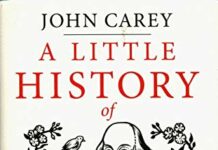
Ebook Info
- Published: 2005
- Number of pages: 246 pages
- Format: PDF
- File Size: 1.96 MB
- Authors: John Carey
Description
In this landmark study, John Carey analyzes the elitest views of some of the most highly respected literary icons of the late 19th and early 20th centuries. This book, as defined in his preface, “is about the response of the English literary intelligentsia to the new phenomenon of mass culture.” Readers may be shocked to learn that H.G. Wells liked to think that this newly emerged “mass” would be eliminated by plague and atomic bombs; that Yeats wished them to perish in an apocalyptic war against the educated classes and that D.H. Lawrence visualized a huge lethal chamber in which they could be exterminated. John Carey’s devastating attack on the intellectuals exposes the loathing which the mass of humanity ignited in many of the virtual founders of modern culture: G.B. Shaw, Ezra Pound, James Joyce, E.M. Forster, Virginia Woolf, T.S. Eliot and others. Professor Carey compares their detestation of common humanity to Nietzsche, whose philosophy helped create the atmosphere leading to the rise of Adolph Hitler. Any student of modern literature and history will find John Carey’s incisive book both enlightening and disturbing, an essential read for a full understanding of where we are today.
User’s Reviews
Editorial Reviews: Review “Witty, passionate and end-to-end readable.” — The Guardian”He denounces snobbish insularity with a gusto I hope will prove contagious in America.” — New York Times Book Review About the Author John Carey is Merton Professor of English at Oxford University. A distinguished critic and broadcaster, he is the author of four previous books on history and literature, and the editor of The Faber Book of Science. He lives in England.
Reviews from Amazon users which were colected at the time this book was published on the website:
⭐I liked this book immensely. If you are interested in culture and literature in a broad sense you may enjoy it. I am much more on the Bennett side than the Woolf side, and it’s nice to read a well argued defense of the depth to be found in ordinary lives. The venom of Woolf and friends was an eye opener. I never cared much for her aesthetic and though I enjoy reading Eliot I am tempted to say, it’s only rock n roll, not holy scripture. The elitism of Wolf and her coterie is carried to a frightening extent, with their admiration of fascist thought, Ezra Pound is one example. This a comp!icated subject, what is art and what is not, and this book is worth reading for its contribution to that debate.
⭐Intellectuals seem to have the idea that they are not like the rest of us. Their arguments for promoting this idea are analyzed in this book. The works of the intelligentsia are made to speak for themselves and the picture is frequently unpleasant.Generalizations are always problematic and feed into the kinds of false premises and observations Carey exposes in his analysis. The results are potentially as insidious as the programs of the intelligentsia discussed but that potential misuse doesn’t detract from the author’s opinions. Many artists and intellectuals are dangerously elitist, but so are the prejudices of the classes of people these intellectuals find so distasteful.This is a refreshing expose of ideas and the people who clung so fiercely to them.It is irrefutable that many people, thinkers of whatever quality, shared many of the same prejudices as Hitler and other Fascists. Revealing this unpleasant truth does not disqualify Carey’s argument or his approach — as another reviewer argues, saying merely mentioning a polarizing figure like Hitler prejudices the discussion and disqualifies the author because it seems a cheap tactic to demonize the intelligentsia by mentioning their affinities to the ideas of a monster. Carey lets the authors testify through their own writing.Recommended.
⭐This book analyses the appeal of certain literature to different classes or groups of people. It is a novel survey of cultural tastes of the period.
⭐This is an essay a very excellent one on a subject never covered before . I would very highly recommend it.
⭐I ordered this book because I’d read Professor Carey’s excellent books on Thackeray and Dickens, and expected this would be of the same quality. To say I was disappointed is a huge understatement. Carey argues that modernism was a complicit plot by snobbish intellectuals–T.S. Eliot, Wyndham Lewis, all the usual suspects–to exclude “the masses” from reading their works, thereby ignoring all the major factor that led to “The Waste Land” & etc. Pure nonsense!!!
⭐Carey, John. The Intellectuals and the Masses: Pride and Prejudice among the Literary Intelligentsia, 1880-1939This iconoclastic account of the attitude of intellectuals towards popular writing in the sixty years from 1880 to the Second World War is at times brilliant and at other times unfair. As an opponent of snobbish exclusiveness Carey does a hatchet job on literary idols, such as TS Eliot, Virginia Woolf and HG Wells who all evince a contempt for the ‘masses.’ But while Eliot and Woolf look down on the ordinary man, Wells is in fact from the ordinary working class and his New Republic is obviously fantasy, a Hitlerian vision of a gentrified holocaust in which the weak are eliminated. Carey is unfair to Joyce too, stating that Bloom ‘is expelled from the circle of the intelligentsia.’ He blames Joyce for rigorously excluding people like Bloom from reading an obscure book like Ulysees. I can see Poldy in retirement being fascinated by it. He is intelligent and enquiring enough. In any case, who in the novel belongs in this magic circle? Stephen perhaps?On the other hand, taking off from Virginia Woolf’s essay on ‘Mr Bennett and Mrs Brown,’ Carey devotes 29 pages, the longest chapter in the book, to celebrating the work of Arnold Bennett, whose ‘novels are still undervalued by literary academics, syllabus-devisers and other official censors.’ Who are these ‘censors’ who go about undervaluing Bennett? Anyway, ‘they’ are enrolled in Carey’s club of intelligentsia who despise any author who is popular and makes money from his writing. In any case is Bennett really that good? Would a young person today get more from Clayhanger than from Mrs Dalloway for example?The Intellectuals and the Masses is of course not primarily concerned with literary criticism but with the politco-social scene 75 years ago. It begins and ends with discussion of the then growing population problem – now best not thought about. A study of fiction readership today would provide a very different picture. The paperback, the ebook and the exponential rise of the self-publishing industry have liberated the so-called masses from traditional reading habits. There are literally thousands of prizes offered worldwide for innovative cheap fiction. Anyone may write and publish. There’s no room for snobs and prigs in a culture ruled by the merry-go-round of television and the internet.
⭐There’s a massive amount to champion in this excellent dissection of high brow superiority complexes. In a day when we once again have a feeling that certain ‘well read’ (their favourite retort) types feel they are somehow better than everyone else, in a time when celebrity interest in the environment and society only extends to lecturing us bottom-feeders while they live in absurd luxury, this is the kind of book that’s needed. A reminder that many of yesteryear’s beloved intellectuals – the kind of people who are quoted by people thinking they have definitively won an argument – like Nietzsche, Woolfe and Wyndham Lewis had a barely concealed contempt for the masses. That out-of-touch-from-reality miasma has long permeated around supposed intellectuals and this book is a delightful kick in the gearbox for such a set. Where it falls down is in its amateur psychoanalysis of said people, using that form of science that often slips into flim-flammery itself. It increases as the book progresses and, just like an intellectual, you cannot argue or dispute with someone using psychology to discuss things as you just get hit with ‘You just don’t understand’. A bit like when I told people I didn’t like The Matrix.Still, a few beloved intellectual giants get a deserved battering from the author who writes lucidly. Despite its flaw, its essential reading.
⭐I think that this is one of the most illuminating books I have ever read on the relationship between the intellectualls and the masses. Actually, it unmasks the phony liberalism of the English modernists of the Fabian society such as Bernard Shaw, Wells and Virginia Woolf.As for the right -wingers I have already Knew about their misanthropy. Also, it sheds light on th ethorny subject of both the growing of suburbia and of social housing which destroyed the idyllic rural landscape of most of Southern England. finally, it makes reference to the dilsike of children by them intellectualls who thought thata <,nothing worse for spirit than a pram in the home;s corridor>>
⭐This is a shattering and shocking revelation of how English literary intellectuals in the late nineteenth and early twentieth centuries embraced an attitude to the masses which can be seen as leading on to the Nazi view of the desirability of exterminating the great mass of those viewed by themselves as inferior. It has a power to shock beyond any book I have read since I first read Orwell’s 1984 more than half a century ago.
⭐The theme that runs through this to its conclusion which brings ‘intellectual’ kinship with the Nazis is of a despising of ‘the masses’ by elites whose rarified and narrow outlooks implicitly argue for a sort of aristocracy to rule the dirty and stupid. Well written and will never go out of date.
⭐Unusually for a book of this kind, never did I want to jump ahead, so gripping and appropriate were the examples cited. I most heartily recommend Prof Carey’ book.
Keywords
Free Download The Intellectuals And The Masses: Pride and Prejudice Among the Literary Intelligensia, 1880-1939 in PDF format
The Intellectuals And The Masses: Pride and Prejudice Among the Literary Intelligensia, 1880-1939 PDF Free Download
Download The Intellectuals And The Masses: Pride and Prejudice Among the Literary Intelligensia, 1880-1939 2005 PDF Free
The Intellectuals And The Masses: Pride and Prejudice Among the Literary Intelligensia, 1880-1939 2005 PDF Free Download
Download The Intellectuals And The Masses: Pride and Prejudice Among the Literary Intelligensia, 1880-1939 PDF
Free Download Ebook The Intellectuals And The Masses: Pride and Prejudice Among the Literary Intelligensia, 1880-1939


